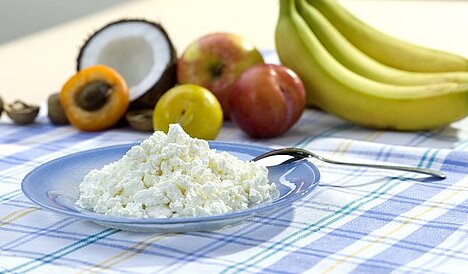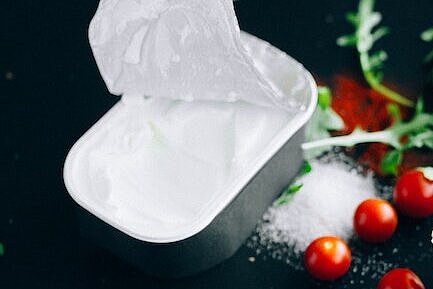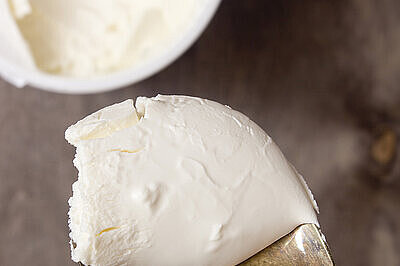Quark

Quark is a popular dairy product that many people like to eat. But what about dogs? Can dogs eat quark? Is quark healthy for dogs? And how much quark can a dog eat? In this article, you'll find out everything you need to know about quark for dogs.
What is quark?
Quark is a fresh cheese made from milk. The milk is curdled by lactic acid bacteria or rennet and the whey is then separated out. The result is a white, creamy cheese that varies in firmness depending on its fat content.
Quark contains a lot of protein, calcium and phosphorus, but little lactose (milk sugar). This makes it a valuable food for humans and dogs.
Can dogs eat quark?
Yes, dogs can eat quark. In contrast to pure milk, which many dogs cannot tolerate because they lack the enzyme lactase, quark is low in lactose and therefore usually easily digestible. Even dogs with a lactose intolerance can often eat small amounts of quark without any problems.
However, quark should not be used as the main food, but only given as a supplement or treat. Quark alone does not meet a dog's nutritional requirements and can lead to digestive problems or obesity if fed in excess.
What are the benefits of quark for dogs?
Quark has a number of health benefits for dogs:
- Curd is rich in protein, which is important for muscle building, cell regeneration and the immune system. Curd cheese contains all the essential amino acids that dogs cannot produce themselves and must therefore obtain from their food.
- Quark is a good source of calcium and phosphorus, which are essential for bone and dental health. Many dogs suffer from a deficiency of these minerals, especially if they are fed a raw or grain-free diet. Quark can help to compensate for this deficiency.
- Quark is suitable as a light diet in the event of diarrhea or vomiting, as it soothes the stomach and supports the intestinal flora. It also provides the weakened dog with energy and fluids.
- Quark can help with weight loss as it has a filling effect and stimulates the metabolism. It has a low glycemic index, which means that it does not cause a sharp rise in blood sugar levels and thus prevents cravings.
What are the disadvantages of quark for dogs?
Quark also has some disadvantages for dogs' health:
- Quark can cause bloating or diarrhea in some dogs, especially if they are not used to it or eat too much of it. Curd should therefore always be introduced slowly and only given in small quantities.
- Curd cheese can cause allergies or intolerances in some dogs, especially if they have a milk protein allergy. Symptoms can include itching, skin rashes or ear infections. In this case, curd should be avoided or a vet should be consulted.
- Quark can lead to hyperacidity in some dogs as it lowers the pH value in the stomach. This can lead to heartburn or stomach ulcers. Curd cheese should therefore always be mixed with a little oil (e.g. linseed oil) to neutralize the acidity.
How much quark can a dog eat?
The amount of curd a dog can eat depends on various factors, such as the dog's size, weight, age, activity and health. As a rule of thumb, a dog can eat about one to two tablespoons of quark per day. This corresponds to about 20 to 40 grams.
For puppies or small dogs, the amount should be reduced accordingly; for large or very active dogs, it can be increased slightly. It is important to adjust the total amount of food to avoid overfeeding.
If quark is given as a bland diet in case of diarrhea or vomiting, the amount can be increased for a short time until the dog feels better. Then you should go back to the normal amount.
How can you prepare quark for dogs?
Curd cheese for dogs can be prepared and offered in various ways. Here are some ideas:
- Give quark on its own as a treat or reward.
- Mix quark with a little oil (e.g. linseed oil) and mix into the food.
- Sweeten quark with honey or banana and give as a dessert.
- Mix quark with oat flakes or rice and give as porridge.
- Mix quark with egg and flour to make a dough and bake small cookies.
Quark is a healthy dairy product that dogs can eat in moderation. It contains a lot of protein, calcium and phosphorus and can promote dogs' health. It is also suitable as a light diet in the event of diarrhea or vomiting or as a diet aid when losing weight.
However, quark should not be used as the main food, but only given as a supplement or treat. Too much quark can lead to digestive problems, allergies or hyperacidity. Curd should therefore always be introduced slowly and only given in small quantities.
Curd cheese for dogs can be prepared and offered in various ways. However, you should always make sure that the quark is fresh and does not contain any additives.
If you notice any signs of hypersensitivity or poisoning in your dog, you should see your vet immediately. We are not a substitute for a vet, but we try to be as accurate as possible. Every dog reacts differently and we recommend you get a second opinion or consult your vet if in doubt.
Stay healthy and take good care of your four-legged friend!😊
Similar to Quark
Ricotta is non-toxic to dogs and can be used in small amounts as a treat or to administer medication. Ricotta contains a lot of protein, which is important for muscle building and cell regeneration....
Cream cheese is a dairy product made from pasteurized or ultra-high temperature cow's milk. Lactic acid bacteria and rennet are added to the milk, causing the milk to coagulate and the solid...
Mascarpone contains a lot of fat and protein, which are important nutrients for dogs. Fat provides energy and supports healthy skin and coat. Protein is a building block for muscles, organs and the...
Yoghurt is a dairy product made by fermenting milk with certain bacterial cultures. This converts the lactose, i.e. the milk sugar, into lactic acid. This gives yogurt its typical taste and creamy...



